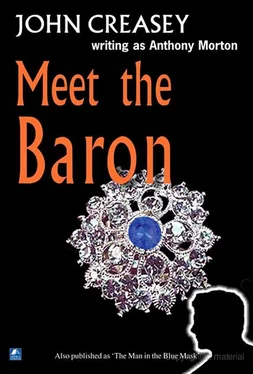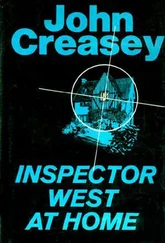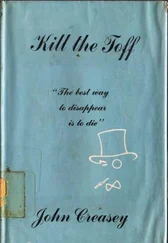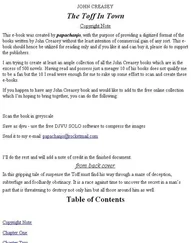John Creasey - Meet The Baron
Здесь есть возможность читать онлайн «John Creasey - Meet The Baron» весь текст электронной книги совершенно бесплатно (целиком полную версию без сокращений). В некоторых случаях можно слушать аудио, скачать через торрент в формате fb2 и присутствует краткое содержание. Жанр: Старинная литература, на русском языке. Описание произведения, (предисловие) а так же отзывы посетителей доступны на портале библиотеки ЛибКат.
- Название:Meet The Baron
- Автор:
- Жанр:
- Год:неизвестен
- ISBN:нет данных
- Рейтинг книги:5 / 5. Голосов: 1
-
Избранное:Добавить в избранное
- Отзывы:
-
Ваша оценка:
- 100
- 1
- 2
- 3
- 4
- 5
Meet The Baron: краткое содержание, описание и аннотация
Предлагаем к чтению аннотацию, описание, краткое содержание или предисловие (зависит от того, что написал сам автор книги «Meet The Baron»). Если вы не нашли необходимую информацию о книге — напишите в комментариях, мы постараемся отыскать её.
Meet The Baron — читать онлайн бесплатно полную книгу (весь текст) целиком
Ниже представлен текст книги, разбитый по страницам. Система сохранения места последней прочитанной страницы, позволяет с удобством читать онлайн бесплатно книгу «Meet The Baron», без необходимости каждый раз заново искать на чём Вы остановились. Поставьте закладку, и сможете в любой момент перейти на страницу, на которой закончили чтение.
Интервал:
Закладка:
Mannering shook his head decisively, and there was a subtle change in the expression in Lee’s eyes.
“No. I haven’t come to borrow, Mr Lee. I’ve come about some — rumours, shall we say?”
Mannering spoke casually, but there was a barb in the words. Lee knew it, and his eyes narrowed. His lined face was expressionless.
“Strange things rumours, yes?”
“So strange that usually it doesn’t pay to believe them,” said Mannering. “But this one was very intriguing. It concerned the Rosa pearls, Mr Lee.”
There was no mistaking Lee’s interest now, and there was a hint of alarm in his eyes. It went quickly, and he shrugged his shoulders. “So . . .”
“Now, the Rosa pearls,” went on Mannering casually, “were stolen from the Randenbergs, in New York, three years ago. I’ve heard a rumour — you won’t be interested in where it came from, Mr Lee — that they are now in London.”
“Ye-esss,” murmured Lee.
“Very beautiful things,” murmured Mannering. “The rose-tinted queen pearls in the centre and the famous Rosa graduation. Quite the most famous pearls in America, weren’t they?”
“Ye-esss,” murmured Lee again.
“And there is a certain collector,” said Mannering, with a widening smile, “who would be willing to pay good money for them; within reason, of course. Working on the hypothesis that the Rosa pearls were in the market, how much would you think they were worth, Mr Lee ?”
The Jew was rubbing his thumb across the bridge of his nose, and the expression in his eyes was remarkably cunning.
“Veil,” he said smoothly, “vorking on that strange hypothesis, my tear Mr Mannering, I might say — twenty thousand pounds.”
Mannering’s lips twitched at the corners.
“And now carry the hypothesis a little further. Supposing they were available in London as stolen property, and not in the open market? How much then, Mr Lee?”
Septimus Lee spread his blue-veined hands across his desk, and peered into Mannering’s laughing eyes. He was on his guard, Mannering knew: their swords were crossed.
“Vell — should ve say fifteen thousand ?”
“A little high,” said Mannering judicially. “If I — of course I’m no expert in pearls, Mr Lee — but if I were to estimate a figure for the Rosa pearls in those circumstances I shouldn’t go a pound higher than twelve thousand five hundred.”
“No?”
“Not a pound.”
Lee took his hands from his desk, and rubbed them together with a faint sliding noise. His eyes were half closed.
“Perhaps twelve thousand five hundred, Mr Mannering, and a percentage of commission for the middle-man, eh?”
“Come,” said Mannering cheerfully, “I’m assuming that only two people would know anything about the sale — the two principals. Would that figure be — er — acceptable, do you think?”
For a moment there was no sound nor movement in the room. Then Lee bent forward, with a little exclamation.
“Just how much do you know, Mr Mannering?”
“Just as much as I seem to,” said Mannering. The smile was still on his lips, but it had gone from his eyes. “You have the Rosas, Mr Lee. No one besides yourself and one other knows they are in England.”
“Two others,” said Lee thoughtfully. “My colleague — and yourself.”
Mannering nodded, and the laughter came back to his eyes; he had made his final thrust and scored well.
“Yes, of course. But I didn’t know until you confirmed it, Mr Lee. Shall I lay all my cards on the table?”
“It is an idea,” admitted Lee.
“H’m. Well, I was one of many who were prepared to purchase the Rosa pearls from the Randenbergs, and one of many who were disappointed when they were stolen. A friend of mine in America whispered — just whispered, Mr Lee — that sometimes you were in possession of gems which had — er — left the United States, and I put two and two together.”
“Because you were still interested in them?”
“Precisely.”
“Vell,” said the Jew slowly, “I vill not ask questions, Mr Mannering, although it would seem that you have strange friends. Just the one question I would ask. You are acquainted with the police?”
Mannering’s expression did not change.
“I am a collector of precious stones, Mr Lee.”
The Jew seemed to think for a moment. His eyes closed and his fingers intertwined slowly, tenuously. At last: “This twelve thousand five hundred pounds, Mr Mannering. The transaction would be cash, of course?”
“My cheque is as good as cash,” said Mannering.
“Ye-es, of course. But in transactions of this kind . . .”
“Mr Lee,” said Mannering gently, “I have every respect for you and your methods, but I would not bring twelve thousand pounds in cash into your office or your home for any purpose whatsoever. I heard a rumour that you have the pearls. Others might hear it too. My cheque against the Rosas.”
Again Lee seemed to lose himself in his thoughts, and there was silence for several minutes. He came out of his reverie, and nodded. Quick decisions, he knew, were essential.
“Shall we consider the matter settled ?”
“Time and place?” asked Mannering.
“These offices, Mr Mannering, to-morrow, at twelve noon.”
“To-morrow is all right,” said Mannering, “but twelve is too late. Ten o’clock . . .”
“Must it be so early?” Lee questioned.
“I shall be leaving London soon after eleven,” said Mannering. “If you care to leave it until next week . . .”
Lee shook his head, as Mannering had expected. Lee was not a man to keep a deal of this nature hanging fire.
“Ten o’clock, then,” the Jew said.
“Excellent,” said Mannering.
A few minutes later he took his leave of the financier, knowing that both of them were — so far — well satisfied with the interview. Mannering perhaps with more justification than the other.
Septimus Lee was a clever man, but there were things he did not know. He was unaware, for instance, that he was followed for the rest of the day by a man he would not have recognised even if he had seen him.
Mannering had little faith in disguises, but a beard was a simple arrangement, and he was not likely to be examined carefully while he affected it. His chief complaint was that it made his face hot and sticky, for the weather was still warm, but he bore the discomfort philosophically.
Septimus Lee went from the offices of the Severell Trust, in the Strand, to a safe-deposit in Southampton Row. He travelled in a Daimler saloon that purred through the evening traffic, while Mannering, bearded and in a Frazer-Nash, kept it in sight. Just for a moment, when the little Jew stepped out of the Daimler outside the deposit, Mannering thought he had slipped up. Then he smiled. Septimus Lee was too careful to hold the deposit-key under his own name.
But it was clever, Mannering admitted. The only likeness between the Jew who had stepped into the Daimler and the Jew who had stepped out of it was in stature. The first man had been old and wrinkled, while the second appeared to be young and smooth-faced. It was a remarkable transformation, and had he not actually followed the Daimler Mannering would never have recognised Lee in his disguise.
After twenty minutes Lee reappeared, and the Daimler moved off. In the brief interval Mannering had hurried to a near-by garage and complained that his Frazer-Nash was going badly, leaving the two-seater for repair while hiring a Vauxhall-Six. After leaving the garage at the wheel of the larger car Mannering also changed his beard for a heavy moustache typical of the Victorian era. No matter how keen Septimus Lee’s eyes were he could not have suspected the identity of the driver of the Vauxhall which left the kerb a moment after the Daimler.
Читать дальшеИнтервал:
Закладка:
Похожие книги на «Meet The Baron»
Представляем Вашему вниманию похожие книги на «Meet The Baron» списком для выбора. Мы отобрали схожую по названию и смыслу литературу в надежде предоставить читателям больше вариантов отыскать новые, интересные, ещё непрочитанные произведения.
Обсуждение, отзывы о книге «Meet The Baron» и просто собственные мнения читателей. Оставьте ваши комментарии, напишите, что Вы думаете о произведении, его смысле или главных героях. Укажите что конкретно понравилось, а что нет, и почему Вы так считаете.












